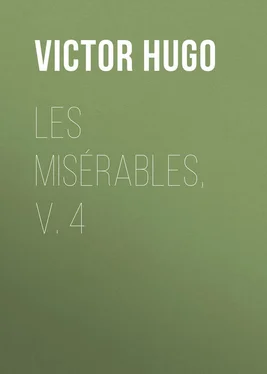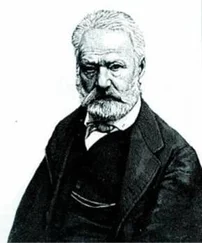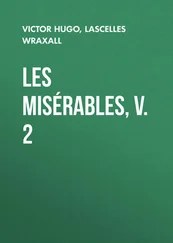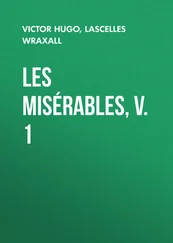Victor Hugo - Les Misérables, v. 4
Здесь есть возможность читать онлайн «Victor Hugo - Les Misérables, v. 4» — ознакомительный отрывок электронной книги совершенно бесплатно, а после прочтения отрывка купить полную версию. В некоторых случаях можно слушать аудио, скачать через торрент в формате fb2 и присутствует краткое содержание. Жанр: literature_19, foreign_antique, foreign_prose, на английском языке. Описание произведения, (предисловие) а так же отзывы посетителей доступны на портале библиотеки ЛибКат.
- Название:Les Misérables, v. 4
- Автор:
- Жанр:
- Год:неизвестен
- ISBN:нет данных
- Рейтинг книги:4 / 5. Голосов: 1
-
Избранное:Добавить в избранное
- Отзывы:
-
Ваша оценка:
- 80
- 1
- 2
- 3
- 4
- 5
Les Misérables, v. 4: краткое содержание, описание и аннотация
Предлагаем к чтению аннотацию, описание, краткое содержание или предисловие (зависит от того, что написал сам автор книги «Les Misérables, v. 4»). Если вы не нашли необходимую информацию о книге — напишите в комментариях, мы постараемся отыскать её.
Les Misérables, v. 4 — читать онлайн ознакомительный отрывок
Ниже представлен текст книги, разбитый по страницам. Система сохранения места последней прочитанной страницы, позволяет с удобством читать онлайн бесплатно книгу «Les Misérables, v. 4», без необходимости каждый раз заново искать на чём Вы остановились. Поставьте закладку, и сможете в любой момент перейти на страницу, на которой закончили чтение.
Интервал:
Закладка:
Royol the publisher was dead, and now M. Mabœuf knew nothing but his books, his garden, and his indigo; these were the three shapes which happiness, pleasure, and hope had assumed for him. They were sufficient to live for, and he would say to himself: "When I have made my blue-balls, I shall be rich; I will redeem my plates from the Mont de Piété, bring my Flora into fashion again with charlatanism, the big drum, and advertisements in the papers, and buy, I know where, a copy of Pierre de Medine's "Art of Navigation," with woodcuts, edition 1539." In the mean while, he toiled all day at his indigo patch, and at night went home to water his garden and read his books. M. Mabœuf at this period was close on eighty years of age.
One evening he had a strange apparition. He had returned home while it was still daylight, and found that Mother Plutarch, whose health was not so good as it might be, had gone to bed. He dined upon a bone on which a little meat remained and a lump of bread which he had found on the kitchen table, and was seated on a stone post which acted as a bench in his garden. Near this bench there was, after the fashion of old kitchen-gardens, a sort of tall building of planks in a very rickety condition, a hutch on the ground-floor, and a store-room on the first floor. There were no rabbits in the hutch, but there were a few apples, the remnant of the winter stock, in the store-room. M. Mabœuf was reading, with the help of his spectacles, two books which interested him greatly, and also, a thing more serious at his age, preoccupied him. His natural timidity rendered him prone to accept superstitions. The first of these books was the celebrated treatise of President Delancre, "On the Inconstancy of Spirits," and the other was the quarto work of Mutor de la Rubaudière, "On the Devils of Vauvert and the Goblins of la Bièvre." The latter book interested him the more, because his garden had been in olden times one of the places haunted by the goblins. Twilight was beginning to whiten what is above and blacken what is below. While reading, M. Mabœuf looked over the book which he held in his hand at his plants, and among others at a magnificent rhododendron which was one of his consolations. Four days of wind and sun had passed without a drop of rain, the stems were bending, the buds drooping, the leaves falling, and they all required watering; this rhododendron especially looked in a very sad way. M. Mabœuf was one of those men for whom plants have souls; he had been at work all day in his indigo patch, and was worn out with fatigue, but for all that he rose, laid his books on the bench, and walked in a bent posture and with tottering steps, up to the well. But when he seized the chain he had not sufficient strength to unhook it; he then turned and took a glance of agony at the sky, which was glittering with stars. The evening had that serenity which crushes human sorrow under a lugubrious and eternal joy. The night promised to be as dry as the day had been.
"Stars everywhere!" the old man thought, "not the smallest cloud! not a drop of water!"
And his head, which had been raised a moment before, fell again on his chest, then he looked once more at the sky, murmuring, —
"A little dew! a little pity!"
He tried once again to unhook the well-chain, but could not succeed; at this moment he heard a voice, saying, —
"Father Mabœuf, shall I water the garden for you?" At the same time a sound like that of a wild beast breaking through was heard in the hedge, and he saw a tall thin girl emerge, who stood before him, looking at him boldly. She looked less like a human being than some form engendered of the darkness. Before Father Mabœuf, whom, as we said, a trifle terrified, found time to answer a syllable, this creature, whose movements had in the gloom a sort of strange suddenness, had unhooked the chain, let down and drawn up the bucket, and filled the watering-pot; and the old gentleman saw this apparition, which was barefooted and wore a ragged skirt, running along the flower-beds and distributing life around her. The sound of the water pattering on the leaves filled M. Mabœuf's soul with ravishment, and the rhododendron now seemed to him to be happy. The first bucket emptied, the girl drew a second, then a third, and watered the whole garden. To see her moving thus along the walks in which her outline appeared quite black, and waving on her long thin arms her ragged shawl, she bore a striking resemblance to a bat. When she had finished, Father Mabœuf went up to her with tears in his eyes, and laid his hand on her forehead.
"God will bless you," he said, "you are an angel, since you take care of flowers."
"No," she replied, "I am the Devil, but I don't care."
The old man continued, without waiting for or hearing the reply, —
"What a pity that I am so unhappy and so poor, and can do nothing for you!"
"You can do something," she said.
"What is it!"
"Tell me where M. Marius lives."
The old man did not understand.
"What Monsieur Marius?"
He raised his glassy eyes and seemed seeking something which had vanished.
"A young man who used to come here."
"Ah, yes!" he exclaimed, "I know whom you mean. Wait a minute! Monsieur Marius, Baron Marius Pontmercy, pardieu! lives, or rather he does not live – well, I do not know."
While speaking, he had stooped to straighten a rhododendron branch, and continued, —
"Ah yes, I remember now. He passes very frequently along the boulevard, and goes in the direction of the Lark's field in the Rue Croulebarbe. Look for him there, he will not be difficult to find."
When M. Mabœuf raised his head again, he was alone, and the girl had disappeared. He was decidedly a little frightened.
"Really," he thought, "if my garden were not watered, I should fancy that it was a ghost."
An hour after, when he was in bed, this idea returned to him, and while falling asleep, he said to himself confusedly at the disturbed moment when thought gradually assumes the form of dream in order to pass through sleep, like the fabulous bird which metamorphoses itself into a fish to cross the sea, —
"Really now, this affair greatly resembles what La Rubaudière records about the goblins. Could it have been a ghost?"
CHAPTER IV
MARIUS HAS AN APPARITION
A few days after this visit of a ghost to Father Mabœuf, – it was on a Monday, the day of the five-franc piece which Marius borrowed of Courfeyrac for Thénardier, – Marius placed the coin in his pocket, and before carrying it to the prison, resolved to "take a little walk," hoping that on his return this would make him work. It was, however, eternally thus. As soon as he rose, he sat down before a book and paper to set about some translation, and his work at this time was the translation into French of a celebrated German quarrel, the controversy between Gans and Savigny. He took up Gans, he took up Savigny, read four pages, tried to write one but could not, saw a star between his paper and himself, and got up from his chair, saying, "I will go out, that will put me in the humor," and he proceeded to the Lark's field, where he saw the star more than ever, and Gans and Savigny less. He went home, tried to resume his task, and did not succeed; he could not join a single one of the threads broken in his brain, and so said to himself, "I will not go out to-morrow, for it prevents me from working." But he went out every day.
He lived in the Lark's field more than at Courfeyrac's lodging, and his right address was Boulevard de la Santé, at the seventh tree past the Rue Croulebarbe. On this morning he had left the seventh tree and was seated on the parapet of the bridge over the little stream. The merry sunbeams were flashing through the expanded and luminous leaves. He thought of "Her," and his reverie, becoming a reproach, fell back on himself; he thought bitterly of the indolence and mental paralysis which were gaining on him, and of the night which constantly grew denser before him, so that he could no longer even see the sun. Still, through this painful evolution of indistinct ideas which was not even a soliloquy, as action was so weak in him, and he had no longer the strength to try to feel sad; through this melancholy absorption, we say, sensations from without reached him. He heard behind, below, and on both sides of him, the washerwomen of the Gobelins beating their linen, and above him the birds twittering and singing in the elms. On one side the sound of liberty, happy carelessness, and winged leisure, on the other the sound of labor. Two joyous sounds made him think deeply and almost reflect. All at once he heard amid his depressed ecstasy a voice he knew, that said, —
Читать дальшеИнтервал:
Закладка:
Похожие книги на «Les Misérables, v. 4»
Представляем Вашему вниманию похожие книги на «Les Misérables, v. 4» списком для выбора. Мы отобрали схожую по названию и смыслу литературу в надежде предоставить читателям больше вариантов отыскать новые, интересные, ещё непрочитанные произведения.
Обсуждение, отзывы о книге «Les Misérables, v. 4» и просто собственные мнения читателей. Оставьте ваши комментарии, напишите, что Вы думаете о произведении, его смысле или главных героях. Укажите что конкретно понравилось, а что нет, и почему Вы так считаете.












